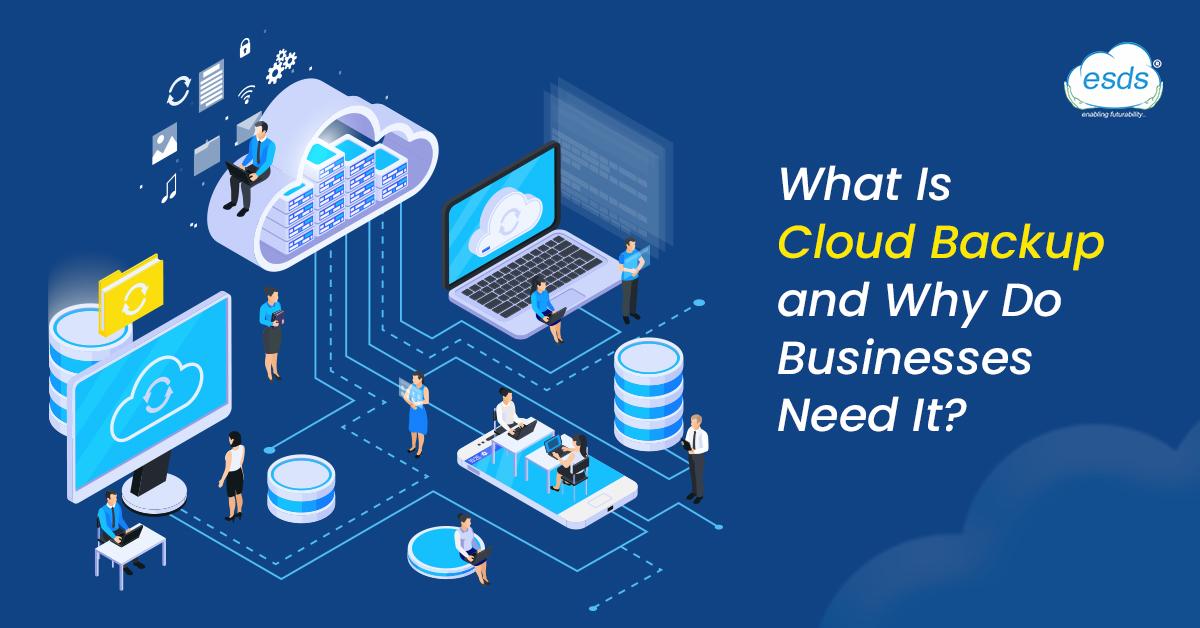What Is Cloud Backup and Why Do Businesses Need It?
In today’s digital world, it’s not uncommon for businesses to have a significant amount of assets stored on their computers. From sensitive customer information and financial data to intellectual property and valuable marketing information, it all needs to be safeguarded.
That’s where cloud backup comes in. Cloud backup is an offsite backup that involves storing data on a remote server. This way, if something happens to your on-premise data, you can quickly and easily retrieve it from the cloud.

There are many benefits of using cloud backup for businesses. Perhaps most importantly, it provides an added layer of protection against data loss due to disasters such as fires, floods, or theft. Additionally, it can be much cheaper and easier to maintain than traditional on-premise backup solutions.
If you’re looking for a reliable, cost-effective way to protect your business’s valuable data, then cloud backup is definitely worth considering.
What Is Cloud Backup?
Cloud backup is a process of backing up data to an offsite location, typically in the cloud. This provides businesses with an additional layer of protection in the event of a disaster, as the data is stored remotely and can be accessed from anywhere.
Why Does Every Business Need A Cloud Backup?
As the world becomes more and more digitized, businesses are increasingly reliant on technology to keep their operations running smoothly. This reliance on technology means that data backups are more important than ever before.

There are several benefits to using cloud backup for your business:
- Cost-effective – Cloud backup is often more cost-effective than traditional on-site data storage solutions. This is because you only pay for the amount of storage you need, and you don’t have to invest in expensive hardware or software.
- Flexible – Cloud backup is very flexible, as you can scale up or down your storage needs depending on your changing business requirements.
- Secure – Cloud backup systems are highly secure, with multiple layers of security to protect your data.
- Reliable – Cloud backup systems are designed to be highly reliable, with regular backups and disaster recovery plans in place to ensure that your data is always safe.
Types of Cloud Backup Services
4 Types of Cloud Backup Solutions
- Directly backing up to the public cloud
- Using a service provider for backup
- Cloud-to-Cloud (C2C) Backup
- Data backup from on-premises to the cloud
There are a number of things to consider when choosing a cloud backup provider. Here are a few key factors:
- How much data backup do you need?
- How often do you need to access your backups?
- What level of security and privacy do you require?
- What is your budget?
Once you have a good understanding of your needs, you can start looking at different providers and compare their offerings. Be sure to read reviews and ask for recommendations before making your final decision.
Getting Started with Your Backup Service
When you first sign up for a cloud backup service, you’ll need to choose what data you want to back up and where you want to store it. You can typically select which files and folders to include in your backup, as well as specify other settings like the frequency of backups and encryption options. Once you’ve configured your backup, the service will start copying your data to its servers.
Depending on the size of your backup and the speed of your internet connection, this initial backup can take some time. After the initial backup is complete, though, subsequent backups will usually be much faster since only new or changed files need to be uploaded.
Once your data is safely stored offsite, you can relax knowing that it will be there if you ever need it. In the event of a disaster at your office, you can simply restore your data from the cloud and get back to work with minimal interruption.
How to Maintain a Cloud Backup Plan
As your business grows, you will inevitably accumulate more data that needs to be backed up. Depending on the size of your business, you may need to invest in a cloud backup solution to ensure that your data is safe and accessible. Here are a few tips on how to maintain a cloud backup plan:
- Define what data needs to be backed up. Not all data is created equal, and you will need to prioritize what is most important to your business. Make sure to consider both current and future needs when making this decision.
- Determine how often you need to back up your data. This will vary depending on how often your data changes and how critical it is to your business operations. For example, if you have real-time data that changes frequently, you will need to back it up more often than static data that doesn’t change as often.
- Select a cloud backup provider that meets your needs. There are many different providers out there, so take the time to research and select one that offers the features and services that are most important to you.
- Implement a testing and recovery plan. Even with the best backup plan, things can still go wrong. That’s why it’s important to have a testing and recovery plan in place to ensure that you can quickly and easily recover your data in the event of an issue.
Conclusion:
Cloud backup is an essential tool for businesses of all sizes. It helps protect your data in the event of a disaster and can save you time and money by making it easier to recover from data loss. If you’re not already using cloud backup, we encourage you to give it a try.
- Top 5 Data Center Trends for 2024 - October 11, 2023
- Top 15 Cloud Computing Trends 2024 - October 4, 2023
- What is Infrastructure Monitoring and Why Infrastructure Monitoring Tool is Important for Your Business? - September 20, 2023
